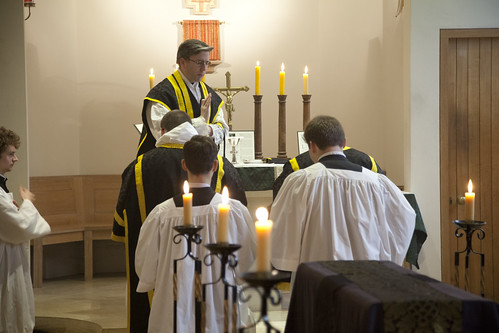 |
| The absolution before Communion: High Mass of Requiem at St Benet's Hall (Fr Edward van den Burgh) |
This is something worthy of a slightly wider audience, I think: from The Tablet's Christmas double issue (18th December).
The same issue has an article by the radio journalist Madeleine Bunting, who is creating a programme for Radio 3 on ritual. Coincidentally she refers to the very interesting book by Byung-Chul Han, The Disappearance of Rituals, which I am currently reading.
The Protestant and Enlightenment theory about ritual has caused a terrible devastation of Western culture, to whit (as Bunting quotes the Catholic anthropologist Mary Douglas) "ritual has become a bad word signifying empty
conformity." This theory, though still guiding many institutions and people, has now pretty well run out of intellectual steam. The interesting people are now rejecting it as old hat, and looking at what ritual did for the societies which had or still have it, and why those which lack it are missing out on something of great importance.
This is not the moment, obviously, for the final dissolution of the Church's ancient liturgical tradition. This effort is coming from people whose ideas are at least half a century out of date. (Mary Douglas was writing in the 1960s.)
-----------------------
Even as a supporter of the
liturgical reform, I would have
to admit that the Constitution
on the Sacred Liturgy is left-brained. Article 34 is a classic
example: “The rites should be …
short, clear, and unencumbered
by useless repetitions.”
The academic study of ritual
was only starting in the 1960s.
It has taken over 50 years for
leading thinkers like Iain
McGilchrist (“The singing of
things”, 4 December) to suggest
how and why we have largely
lost something near-indefinable
from the pre-Vatican II liturgy –
when it was celebrated well at a
High Mass or Missa cantata. In
his chapter on “The Sense of the
Sacred”, he talks of “a deep
gravitational pull towards
something ineffable”.
Ritual, like all art, is used
when its object cannot be
defined in words – or in rubrics,
or in Vatican documents.
Liturgy is an instrument of
worship by those who take part
in it – a means, not the end itself.
Worship is indefinable because
its object, God, is ineffable –
literally “beyond speech” – thus
its exercise is right-brained,
rather than left-brained. That is
why art, especially music, can
assist worship so effectively
when it illumines the ritual being
performed. One cannot
understand the worship signified
by ritual, but one can discern it,
intuit it, even be grasped by its
mover, the Holy Spirit.
JOHN AINSLIE
LONDON N20
Support the Latin Mass Society
No comments:
Post a Comment